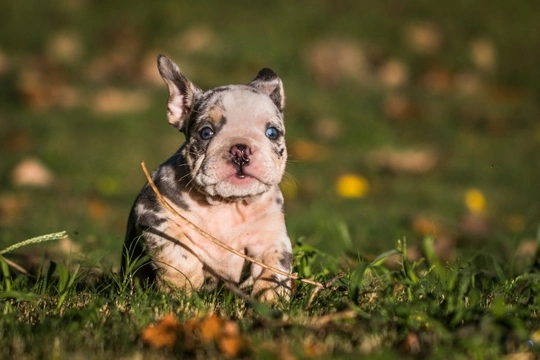
Merle Bulldogs - What You Need to Know About Merle English Bulldogs
Merle English Bulldogs are captivating dogs, admired for their unique and beautiful coat pattern. However, alongside their distinctive appearance come important health considerations and ethical concerns that every potential owner should understand. This article aims to guide you through everything you need to know about the merle trait, the associated health risks, Kennel Club registration restrictions, and why responsible ownership and ethical breeding are paramount when considering a Merle English Bulldog.
Understanding the Merle Trait
The merle pattern refers to a striking coat colouration characterised by patches of darker shades scattered on a lighter background, sometimes called "dapple" in certain breeds. This pattern is inherited through the merle gene, which affects the coat’s pigment and can also influence eye and skin colour—often causing blue or odd-coloured eyes, and sometimes unusual skin pigmentation.
In English Bulldogs, merle colouring is less common and somewhat controversial. The merle gene is dominant, and dogs carrying this gene (denoted as “M”) exhibit the pattern, while non-merle dogs carry the recessive “m” gene. Some breeders assert that merle colours can occur naturally within bulldog lines, though it often arises via the introduction of genes from other breeds known to carry merle markers.
Health Issues Linked to the Merle Gene
Despite their striking looks, Merle Bulldogs face significant health risks. Importantly, the merle gene is associated with a higher likelihood of sensory impairments. Double-merle dogs (those inheriting two merle genes) have a substantial risk of being born with serious vision and hearing problems, including partial or complete deafness and blindness.
Around a quarter of double-merle English Bulldogs reportedly show these severe impairments. This is a grave concern, as these conditions severely affect welfare and quality of life. Additionally, Bulldogs in general are prone to respiratory difficulties, skin problems in their characteristic wrinkles, and other breed-standard health issues that all prospective owners should be aware of.
The Kennel Club’s Stance on Merle Bulldogs
The UK Kennel Club does not recognise Merle English Bulldogs for registration. This is primarily due to the health risks linked with the merle gene and the difficulties in confirming purebred status when merle colouring is present. The Kennel Club’s official position warns that while the merle gene results in the distinctive colouring, it also increases risks of inherited health problems such as hearing and vision issues.
For individuals seeking to buy a dog, understanding “what does KC registered mean?” is crucial. KC registration assures the buyer that their puppy is from a recognised, responsible breeding line that maintains breed health and standard. Since merle English Bulldogs cannot be registered with the Kennel Club, this raises concerns about the ethical standards and health assurances typically provided by KC-registered breeders.
Warnings from Responsible Breeders and Ethical Considerations
Reputable breeders caution strongly against buying Merle Bulldogs without thorough health screenings and clear documentation. The combination of genetic risks and breeding practices that seek out rare coat colours at the expense of health can be detrimental to the dogs and raise welfare concerns.
When considering how to buy a dog, potential owners are encouraged to prioritise breeders who:
- Conduct rigorous health checks, including screening for merle-related conditions
- Provide transparent lineage and health history
- Focus on temperament, health, and welfare over rare colouring
- Comply with Kennel Club standards and guidelines
For those wanting to find a responsible breeder, the Kennel Club's Find a Puppy tool is an excellent resource, connecting potential owners with trustworthy breeders who adhere to ethical practices and breed standards.
Cost and Practical Advice for Potential Owners
Merle English Bulldogs typically command higher prices due to their rarity and appearance. However, it is vital to consider the potential health costs involved, including veterinary care for hereditary issues and sensory impairments. This is not a justifiable trade-off for many owners committed to responsible dog ownership.
Before bringing a Merle Bulldog into your home, reflect on:
- Comprehensive research about the breed and specific health risks
- Scheduling a visit with the breeder to assess living conditions and ask about health guarantees
- Being prepared for regular veterinary checks, particularly regarding hearing, vision, and skin care
- Understanding that Bulldogs require moderate exercise and careful climate consideration due to their respiratory sensitivity
Remember, a beautiful coat should never overshadow the wellbeing and happiness of your future companion.
Final Thoughts
Merle English Bulldogs are undeniably striking dogs with a unique appearance. However, the associated health risks and Kennel Club registration restrictions mean prospective owners should proceed with caution and care. It is crucial to promote responsible ownership by choosing ethical breeders who prioritise the dog’s health, welfare, and temperament above all else.
Use reputable platforms such as the Kennel Club’s Find a Puppy to locate KC-registered breeders, ensuring your new dog has the best start in life and a chance of good health. Always educate yourself on the genetics behind merle colouring and be wary of breeders offering Merle Bulldogs solely for their novelty.
By making thoughtful, informed choices, you contribute to the wellbeing of these wonderful dogs and foster better breeding practices within the community.



